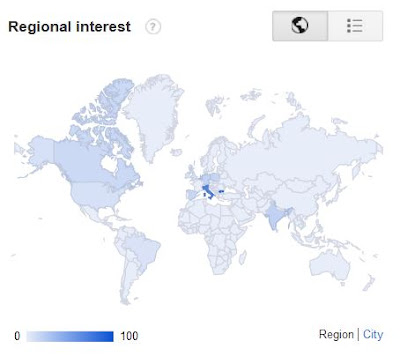Result of a "google trends" search of the terms "Rossi" and "e-cat"
I said in a previous post that I have lost all interest in the "E-Cat", purported desktop nuclear device invented by Mr. Andrea Rossi. Although initially I had found it intriguing, and even fun (also here), it had become a never ending story, eventually boring.
However, if the e-cat is not interesting as an energy producing device, it is still an interesting case-study of information diffusion over the web. In the figure above, you see the results given by a "google trends" search that measures the number of times that a certain term is typed in the Google search engine. Looking for "e-cat", together with "Rossi" the result is that many people agree with me: the e-cat story was interesting at the beginning, now not so much any more.
Note, indeed, how the recent attempts by Andrea Rossi and his followers to revive interest in the device have had little success. The most recent interest peak is related to the so called "hot cat" that was supposed to be an improved version of the old ones. It did produce a little "bump" in the curve, but nothing more. The cat still bounces a little, but it is basically dead.
Of course, the fact that people are losing interest in the e-cat device doesn't necessarily mean that the device doesn't work. However, if we compare with a device that really works, we see the difference. See, for instance, a comparison of the search volume for the e-cat and the ipad (the ipad is the red line)
As you see, the difference is gigantic. The ipad works and can be bought, so lots of people are looking for the term. Instead, there is no evidence that the e-cat works and surely it cannot be bought anywhere. Hence, it is is popular only with a tiny group of believers and, it appears, with a just as tiny group of unbelievers who still find the story interesting.
But who is interested in the e-cat? Google trends is a fascinating site because it also provides you with geographical information.
By far, the E-Cat is an Italian phenomenon, although, for some reason, it has followers also in the Czech Republic. Sweden comes third, mainly because some faculty members of the University of Uppsala had the misfortune of getting involved in this story. But the E-Cat is not just nationally localized. It is also city localized and Google Trends can tell you that the highest search volume in the world is in Bologna, where another university had the misfortune of getting involved with this story.
Italy seems to be especially interested in dubious nuclear devices. Let's give a look to another term, "Keshe", the name of an Iranian gentleman who claims to have developed remarkable technologies able to provide solutions for climate change, many kinds of diseases, space travel and mass transport employing Magnetic and Gravitational interacting fields.
Let's see first the geographical distribution of the interest for the keyword "keshe":
The result is that Mr. Keshe is way more popular in Bulgaria than in his country of origin, Iran. But, again, Italy shows a remarkably high interest in pseudo-scientific miracle devices, coming second.
Finally, let's compare the two terms: "keshe" and "e-cat" (e-cat is red, keshe is blue)
It seems that, for a brief moment, the Keshe device was more popular than the e-cat. But the public seems to be rapidly losing interest in both. The interest, however, is not going to zero or, at least, not so rapidly. Apparently, there exists a "pool" of people who are especially interested in these matters and they are mainly located in Italy, possibly as a legacy of Mr. Rossi's work (and also, for truly unfathomable reasons, in Bulgaria and in the Czech Republic).
Let me repeat that the result of this search provides no direct indication of whether these devices are doing anything like what they are said to be doing by their inventors. It is, however, an interesting example of how information diffuses over the web and how the public tends to lose interest in claims that are not later substantiated by proof or that lead to something worth of more interest.




